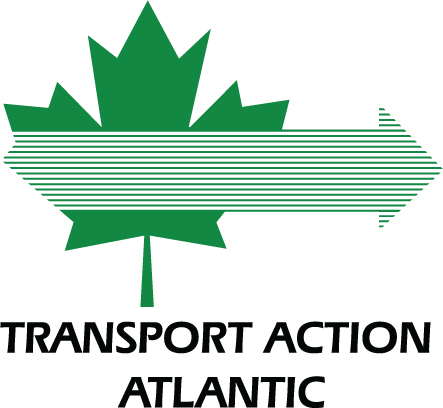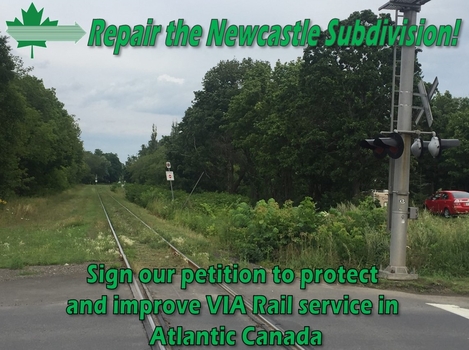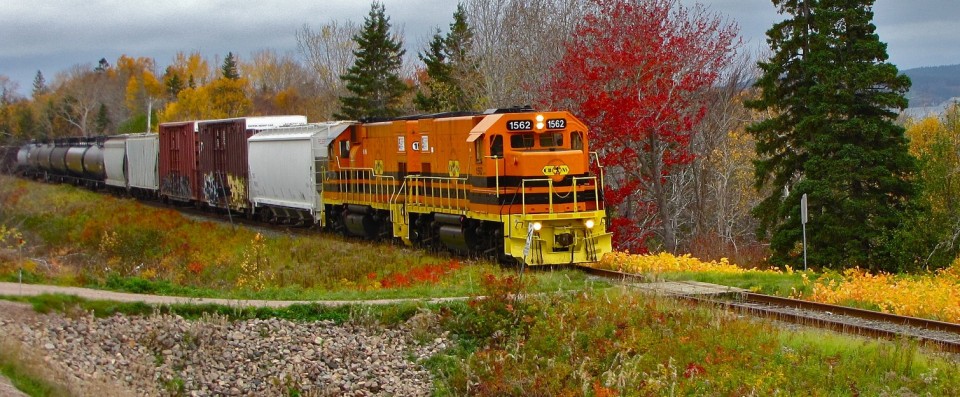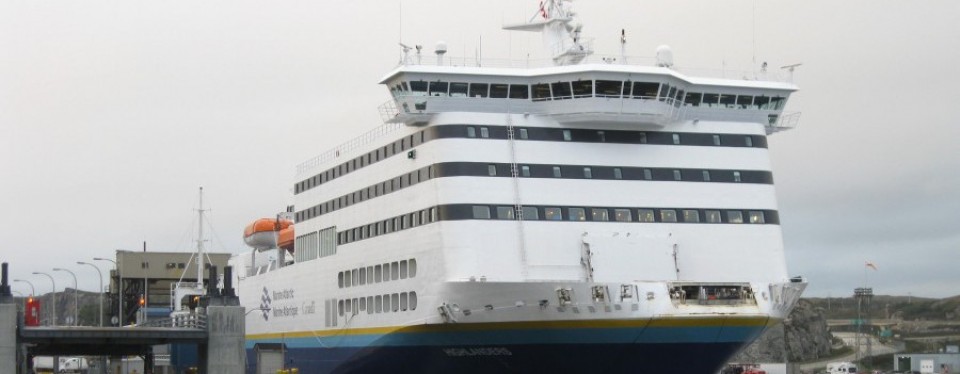Election day in Nova Scotia is rapidly approaching, so Transport Action Atlantic sent the following six questions to the recognized parties in the Nova Scotia election to find out where they stand on key provincial transportation issues. We will be updating this post with their answers as we receive them.
UPDATE May 27, 2017: Answers from the Progressive Conservative Party, the Liberal Party, the Green Party, and the New Democratic Party (NDP) have been added. No responses received to date from the Atlantica Party.
1. What actions will your government take to restore active rail service to the industrial areas of Cape Breton?
PC Party NS: The PC Caucus has been active in supporting efforts to prevent Genesee & Wyoming from tearing up the Cape Breton portion of the tracks and selling them. A PC government will focus on growing our economy, across the Province. A significant number of discussions have taken place to ensure that infrastructure, such as the rail, is in place as Sydney Port continues to grow. A PC Government will continue to support those efforts.
Liberal Party: The Liberal government has met with the operator of the Cape Breton Railway on a number of occasions to see what could be done to continue the railway line. We changed the regulations around the railway line abandonment process to allow extra time for the affected communities to react. This delay has allowed the local communities to do some reports and look at the potential options for the line. Our Liberal government announced a major investment in Cape Breton by adding a second, multi-use berth to the Port of Sydney this year. It will be a 287-metre berth that can accommodate cruise ships as well as increased cargo-related opportunities. This additional berth and the cargo traffic it could generate will help make the business case that a railway system in industrial Cape Breton may still be necessary.
Green Party: We would collaborate with industry, community, and other stakeholders to determine if and when such service can or should be implemented. If it is necessary and feasible, we would pursue it.
NDP: We understand how important it is to Cape Breton’s economy to have a rail line connecting its industrial areas to the rest of the province and country. At the June 2016 policy convention of the Nova Scotia New Democratic Party, members passed the following resolution:
“Therefore Be It Resolved that the NDP press the Nova Scotia Government to insist that the federal government honour a long-standing commitment by funding the purchase and upgrading of the Sydney to Point Tupper line and turning it over to the province, which would then arrange for a suitable operator.”
2. What actions will your government take in areas of transportation and land usage to ensure that aging populations can continue to live and thrive in their communities?
PC Party NS: Nova Scotian seniors built our province. But after all their contributions, seniors are not getting the respect or support they deserve from the McNeil Liberals. Ensuring that aging populations can thrive in their communities will mean a range of supports that reflect the seniors themselves. A PC government will assist low-income seniors to continue living in their homes with dignity by helping to cover the cost of repair projects. A PC government will also release the next stage of the Continuing Care Strategy and will work to ensure seniors have comprehensive access to home care services and high quality long-term care facilities. Millions of dollars of Liberal cuts to nursing homes mean many seniors are eating on less than $5 per day. That just isn’t right. We will immediately reverse the cuts. We will enshrine in law the Seniors’ Bill of Rights to affirm our commitment to the health and well-being of Nova Scotians living in long-term care facilities, now and in the future. This new law will confirm our commitment to provide quality care and accommodation that is safe, comfortable and supports a high quality of life for seniors in nursing homes. Seniors should never be asked to pay more than their fair share. A PC government will freeze the Seniors’ Pharmacare cost-share ratio to ensure no future government will download additional costs to our seniors.
Liberal Party: A re-elected Liberal government will fully implement the Shift Action Plan over a three-year period. This plan contains over 50 specific actions that will improve the lives of our seniors. Included with the Shift Plan will be support for community transportation solutions, primarily targeted at rural areas of the province. We will partner with existing community transportation initiatives as well as help fund solutions in un-serviced or under-serviced areas in rural Nova Scotia. Losing the ability to drive shouldn’t mean that you lose your ability to stay in your home. We want our seniors to stay in their homes longer and that is why our Liberal government has done so much work on long term care. Since we were elected in 2013, we reduced waiting lists for our nursing homes by over 50%. We were able to do this in part by making it easier and more affordable for seniors to stay in their homes. A re-elected Liberal government will double down on our commitment to have seniors remain in their home by expanding the eligibility of the Caregiver Benefit program. This will qualify an additional 1,600 people for $400 per month in support to help our seniors stay in their homes longer.
Green Party: We will pursue community-based health care, including home care options. We will implement a living minimum wage, to ensure that caregiving is an option for more people. We will pursue a basic income guarantee, which would allow families to prioritize caregiving of aging relatives where that is a choice they would like to make.
NDP: While in government, the NDP introduced a Sustainable Transportation Strategy. In 2013, we invested more than $650,000 through the Community Transportation Assistance Program (CTAP) to help 14 community-based transportation organizations fund their operations. While the current Government has continued to provide funding to a number of sustainable transportation initiatives, we know that there is more work to be done.
An NDP government will provide $7 million in core funding to sustainable transportation initiatives. We will build on ongoing work to establish sustainable, affordable and accessible fixed-route transit services in small centres around the province. Whether it’s getting to work, medical appointments or the grocery store, we need to help those who do not have their own means of transportation and encourage those who do to lessen their carbon footprint by using public transit.
In addition, an NDP government will partner with the Halifax Regional Municipality to to support bringing in commuter rail to help residents get in and around the municipality. We have committed to providing up to $5 million to help fund annual operating costs.
3. There is currently no scheduled public transportation service to most of southwestern Nova Scotia – Service ends at Upper Tantallon on the South Shore and Weymouth in Digby County. What would your government do to change this situation?
PC Party NS: A PC government will work with municipalities and support them in their efforts to improve transit infrastructure. We will also be twinning the most dangerous stretches of Nova Scotia highway, including on the 103, and doubling the funding for road repairs under the Rural Impact Mitigation Program so that all vehicles traveling can do so more safely and efficiently. A PC government will implement its 10-year plan to grow our economy while improving our key infrastructure through the Rebuild Nova Scotia fund.
Liberal Party: Our government offers the Nova Scotia Transit Research Incentive program in the Department of Municipal Affairs. This incentive offers funding for transit projects that generate new or improved public transit services in rural or underserviced urban areas of Nova Scotia. This primarily comes in the form of cost sharing with varying levels depending on the scope and complexity of the transit project. A number of feasibility studies and business plans have been completed under the program, most recently in Victoria and Yarmouth.
Green Party: We would seek to cooperate with municipalities to integrate and expand municipal transit services wherever possible. We would consider subsidies on rail or bus services to rural Nova Scotian communities.
NDP: An NDP government would work with the province’s southwestern municipalities to establish community transportation services
4. Transportation is responsible for the second-largest portion of our Province’s carbon emissions (after electricity generation). At the moment, the Department of Energy has been taking the lead on work to reduce these emissions, with the Department of Transportation & Infrastructure Renewal taking a secondary role. Will your government commit to better harmonize the actions of these two departments, or to otherwise better implement a strategy for reducing transportation’s carbon emissions?
PC Party NS: As Progressive Conservatives, we’re proud to have passed the Environmental Goals and Sustainable Prosperity Act (EGSPA). It was ground-breaking legislation that set our province on the path to a greener, more successful future. Now, we must build on that success. A Jamie Baillie government will modernize EGSPA and set new targets for the next 30 years. These new goals will form part of the accountability of all Ministers with regulatory role that is implicated.
Liberal Party: Our Liberal government has negotiated a made-in-Nova Scotia solution to carbon pricing with our federal partners, which will result in a cap & trade system to regulate emissions and emissions targets. A re-elected Liberal government will table and implement legislation to create Nova Scotia cap & trade system, which will be the responsibility of Nova Scotia Environment. To implement a cap and trade system will require a multi department effort.
Green Party: Yes, we support the harmonization with the Department of Transportation, and we firmly support measures to reduce transportation-related carbon emissions.
NDP: We believe Nova Scotia can lead the country in clean energy generation and fighting climate change. Sustainable
transportation is part of our plan for transitioning to a green economy, which also includes legislating a hard target for greenhouse gas emission reductions, continuing the work of Efficiency Nova Scota in reducing energy consumption, working towards a carbon-neutral government, establishing new programs for renewable energy generation, and promoting active transportation and healthy lifestyles.
As part of this strategy, an NDP government will work with the Departments of Energy, Environment and Transportation and Infrastructure Renewal to ensure communication and cooperation as we move forward in our plan for emissions reduction.
5. Will your government commit to having Public transportation explicitly included in one of your minister’s responsibilities? (Rather than being only implicitly being included in Transportation & Infrastructure Renewal, as is the case today).
PC Party NS: A PC government will work with all levels of government, focused on results. The federal government has prioritized transit in its infrastructure spending priorities and a PC government will do everything possible to ensure that Nova Scotia receives its fair share.
Liberal Party: At the present time creating a separate ministry or responsibility for public transportation is not something that is under consideration by our government.
Green Party: The Green Party of Nova Scotia does not have a clear policy on the structure of the government department, but we would consider such a measure, particularly if doing so promised efficiency and effective provision of public transit services.
NDP: This is a change we would be willing to consider if elected.
6. Will your government commit to ensuring that future highway developments do not facilitate urban sprawl?
PC Party NS: A PC government intends to work collaboratively with municipalities and the UNSM to ensure that highway developments not only make travel safer, but meet the existing and future needs of Nova Scotians. Community engagement will be a central part of a PC government’s approach to development.
Liberal Party: While urban sprawl can be a concerning development when it is unchecked it is our belief that the primary driver of this phenomenon is urban planning that restricts density within a city’s urban core. Residents who are unable to find appropriate housing where they work will be forced to live outside an urban space and commute to it. Our government believes that Nova Scotians should have the right to live and work in a variety of communities, both urban and rural, and that it is the responsibility of the provincial government to facilitate these choices by providing adequate, safe transportation between destinations within our province. A re-elected Liberal government will add an additional $390 million dollars to twin highways around our province without the use of tolls. We believe that this will make our roads safer and provide the critical infrastructure Nova Scotians need for their employment and to facilitate the transit of goods and services across the province. The Department of Transportation and Infrastructure Renewal makes decisions for highway twinning based on vehicle volume on our roadways. In addition to our twinning plan, a re-elected Liberal government will spend an additional $30 million to put towards additional safety measures on un-twinned areas of 100 series highways.
Green Party: As a member of the Northwest Planning Advisory Council for five years, I [Deputy Leader Jessica Alexander] regularly advocated for increased urban density to reduce vehicular traffic. In my home community of Lower Sackville, increased urban sprawl was not related highway development, but a matter of land-use bylaws and the municipal planning strategy which prioritized parking availability over a pedestrian-accessible central development plan, as well as an increase on unserviced, estate-sized lots being developed in outlying areas. I believe that wherever possible, we can increase density by insisting that new developments be on city water and sewer services in suburban, and in the city by ensuring that condominium laws are efficient and friendly to both the buying market and to the developer. Highway developments are not part of the Green 2017 platform.
NDP: We know that the safety and quality of our highways and roads is important to Nova Scotians, and we will take the necessary steps to maintain them. However, our aim is to reduce the strain on our highways and roads–and the level of pollution in our province–by expanding and improving our public transportation system in communities across the province.





